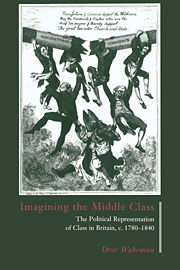Book contents
- Frontmatter
- Contents
- List of figures
- Acknowledgments
- 1 Imagining the ‘middle class’: an introduction
- PART I AGAINST THE TIDE
- Prelude to the 1790s: was the French Revolution a ‘bourgeois revolution’?
- 2 The uses of ‘middle-class’ language in the 1790s
- 3 Friends and foes of the ‘middle class’: the dialogic imagination
- 4 The political differentiation of social language: the debate on the triple assessment, 1797–1798
- Postlude to the 1790s: the uses of ‘bourgeois revolution’
- PART II THE TUG OF WAR
- PART III WITH THE TIDE
- Epilogue
- Index
Prelude to the 1790s: was the French Revolution a ‘bourgeois revolution’?
Published online by Cambridge University Press: 08 January 2010
- Frontmatter
- Contents
- List of figures
- Acknowledgments
- 1 Imagining the ‘middle class’: an introduction
- PART I AGAINST THE TIDE
- Prelude to the 1790s: was the French Revolution a ‘bourgeois revolution’?
- 2 The uses of ‘middle-class’ language in the 1790s
- 3 Friends and foes of the ‘middle class’: the dialogic imagination
- 4 The political differentiation of social language: the debate on the triple assessment, 1797–1798
- Postlude to the 1790s: the uses of ‘bourgeois revolution’
- PART II THE TUG OF WAR
- PART III WITH THE TIDE
- Epilogue
- Index
Summary
The starting point for the present account, then, is the French Revolution. The events in France were the catalysts for the reconfiguration of the British political debate of the 1790s, a reconfiguration in which the language of ‘middle class’ will be shown to have been suddenly infused with powerful and contested political meanings. It may therefore be apt to preface the discussion of this decade with a few suggestive comments made by contemporaries about the French Revolution itself.
As historians of France often point out, an understanding of the French Revolution based on the ‘middle class’ did not come out of the Revolution itself, but took hold among French commentators only some decades after the fact. But the French Revolution drew interpretative energy from many others besides the French. Throughout Europe (and beyond) it was keenly observed, analysed and scrutinized for its possible meanings for people's own social and political experiences. In Britain, recalled Lord Cockburn, people talked ‘of nothing but the French Revolution and its supposed consequences’. ‘Everything, not this or that thing, but literally everything, was soaked in this one event.’ So how did the British make sense of the French Revolution? What was the social vocabulary that they invoked in their own reconstructions of the events in France?
An obvious place to start, one that set the terms for much of the subsequent debate, is Edmund Burke's Reflections on the Revolution in France. To Burke the events in France represented an unparalleled break with the past; yet, oddly, his explanation for these events was still framed within a rather traditional social vision, one that by the 1790s had already become well worn with use.
- Type
- Chapter
- Information
- Imagining the Middle ClassThe Political Representation of Class in Britain, c.1780–1840, pp. 21 - 30Publisher: Cambridge University PressPrint publication year: 1995



